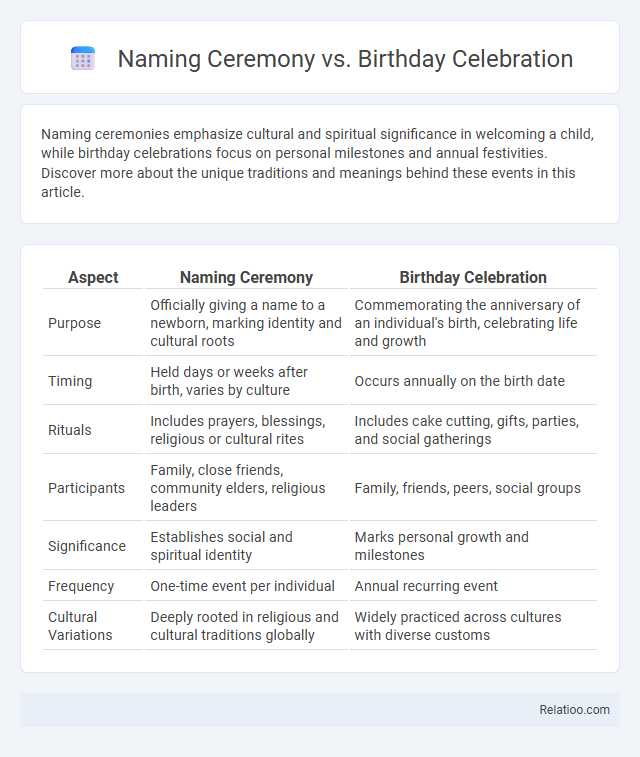Naming ceremonies emphasize cultural and spiritual significance in welcoming a child, while birthday celebrations focus on personal milestones and annual festivities. Discover more about the unique traditions and meanings behind these events in this article.
Table of Comparison
| Aspect | Naming Ceremony | Birthday Celebration |
|---|---|---|
| Purpose | Officially giving a name to a newborn, marking identity and cultural roots | Commemorating the anniversary of an individual's birth, celebrating life and growth |
| Timing | Held days or weeks after birth, varies by culture | Occurs annually on the birth date |
| Rituals | Includes prayers, blessings, religious or cultural rites | Includes cake cutting, gifts, parties, and social gatherings |
| Participants | Family, close friends, community elders, religious leaders | Family, friends, peers, social groups |
| Significance | Establishes social and spiritual identity | Marks personal growth and milestones |
| Frequency | One-time event per individual | Annual recurring event |
| Cultural Variations | Deeply rooted in religious and cultural traditions globally | Widely practiced across cultures with diverse customs |
Definition of Naming Ceremony
A naming ceremony is a cultural or religious event that formally assigns a name to a newborn, often involving rituals and blessings to welcome the child into the community. Unlike a birthday celebration, which marks the anniversary of a child's birth with parties and gifts, the naming ceremony emphasizes the significance of the name and its spiritual or familial meaning. Family plays a central role in the naming ceremony, gathering to participate in the tradition and affirm the child's identity within the lineage.
Understanding Birthday Celebrations
Birthday celebrations mark the annual anniversary of a person's birth, highlighting personal milestones through parties, gifts, and social gatherings. Unlike naming ceremonies, which are cultural or religious events dedicated to officially bestowing a name on a newborn, birthday parties emphasize individual growth and shared joy within families. Your understanding of birthday celebrations deepens when recognizing their role in strengthening family bonds and personalized traditions.
Historical Origins of Naming Ceremonies
Naming ceremonies date back thousands of years and are rooted in various ancient cultures, including Hindu, Jewish, and African traditions, where they marked the formal introduction of a child to the community and spiritual world. Unlike modern birthday celebrations that primarily focus on marking the passage of time and personal milestones, naming ceremonies historically emphasized the child's identity, heritage, and blessings from ancestors or deities. These rituals often involved family and community members, reinforcing social bonds and the child's place within the familial lineage and cultural narrative.
Cultural Significance of Birthday Celebrations
Birthday celebrations hold deep cultural significance as they mark the passage of time and honor individual growth within various traditions. Unlike naming ceremonies, which focus primarily on introducing a child to their community and spiritual identity, birthdays emphasize personal milestones and communal joy. Your participation in these events strengthens family bonds and preserves cultural heritage across generations.
Key Rituals in Naming Ceremonies
Naming ceremonies often involve key rituals such as the formal announcement of the child's name, blessings from elders, and symbolic acts like tying a sacred thread or applying turmeric paste. Birthday celebrations typically focus on cake cutting, gift exchanges, and party games, emphasizing joy and social interaction. Your understanding of these rituals highlights the unique cultural significance and spiritual meaning embedded in naming ceremonies compared to other family events.
Common Traditions in Birthday Celebrations
Birthday celebrations commonly feature traditions such as cake cutting, singing the "Happy Birthday" song, and gift-giving, which symbolize joy and appreciation for the person's life. Family and friends typically gather to share meals, create memorable moments, and uphold rituals that strengthen interpersonal bonds. These customs contrast with naming ceremonies, which focus more on formally introducing a child to the community through specific cultural or religious rites.
Purpose and Symbolism of Each Ceremony
A naming ceremony symbolizes the official presentation and blessing of a child's identity within a community, emphasizing cultural heritage and spiritual significance. Birthday celebrations mark the anniversary of an individual's birth, highlighting personal growth, milestones, and social connections through festive gatherings. Family ceremonies foster unity and continuity, serving as vital rituals that strengthen familial bonds and transmit shared values across generations.
Differences in Guest Participation
Naming ceremonies typically involve close family and select friends, emphasizing cultural or religious traditions with structured rituals, whereas birthday celebrations often welcome a broader range of guests including acquaintances and peers, focusing on fun and social interaction. Guest participation in naming ceremonies is usually more formal and active, involving blessings and symbolic acts, while birthday parties encourage casual engagement through games and entertainment. Family roles in naming ceremonies are central and often ceremonial, but in birthday gatherings, family members may take on hosting and coordinating roles without specific ritual responsibilities.
Gift-Giving Customs Compared
Naming ceremonies typically involve symbolic and culturally significant gifts that honor the child's identity and heritage, while birthday celebrations emphasize fun and personalized presents reflecting the child's current interests. Family dynamics influence gift-giving customs, with close relatives often contributing meaningful heirlooms or traditional items during naming ceremonies, contrasting with more casual or trendy gifts exchanged at birthdays. Your choice of gifts should consider these cultural nuances to honor the occasion appropriately and strengthen family bonds.
Modern Trends in Naming Ceremonies and Birthday Celebrations
Modern trends in naming ceremonies emphasize personalized themes, eco-friendly decorations, and digital invitations, creating intimate moments that strengthen family bonds. Birthday celebrations increasingly incorporate experiential activities and technology-driven entertainment, reflecting evolving social preferences and your desire for memorable experiences. Both events prioritize meaningful connections, blending tradition with contemporary styles to celebrate milestones uniquely within the family.

Infographic: Naming Ceremony vs Birthday Celebration
 relatioo.com
relatioo.com